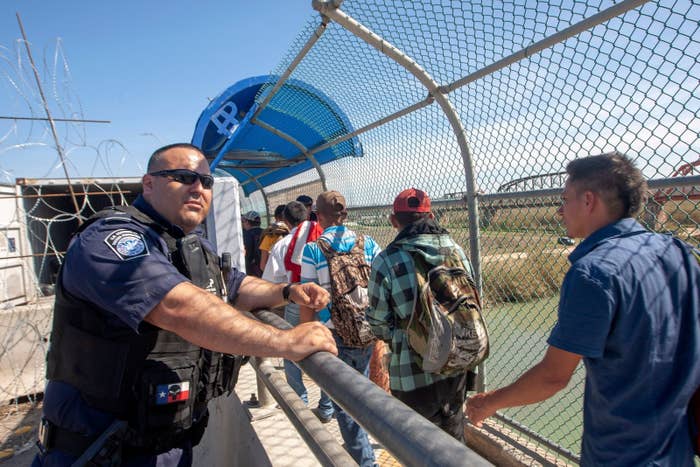
A plan to keep Central American immigrants in Mexico while they wait for their asylum cases to be processed in the US could soon be expanded to new points along the southwest border, Trump administration officials said Friday.
The planned expansion of the policy — called Migration Protection Protocols — represents the administration’s latest attempt to institute sweeping changes to dissuade asylum-seekers from crossing the border and entering the country. In general, asylum-seekers arrive in the US and say they are experiencing persecution or are being targeted for harm in their home countries because of who they are or circumstances out of their control.
The policy went into place on Jan. 28 and initially was focused on single adults at the port of entry in Tijuana. Later, it was extended to families.
The expansion is set to come in the “coming weeks,” according to a Department of Homeland Security official who spoke to reporters Friday.
“We want to take this in a methodical approach,” one DHS official said, saying that the expansion had taken “longer than anticipated.” The policy, the officials said, was just one way to stem the “illegal flow of migrants” that are crossing the border.
The American Civil Liberties Union filed a lawsuit in federal court in San Francisco challenging the policy on Feb. 14 on behalf of 11 individuals seeking asylum who were taken back to Mexico.
In its lawsuit, the ACLU claims that the statute cannot be used against asylum-seekers, and that it violates the Immigration and Nationality Act protections for establishing a right to apply for asylum and blocking the removal of individuals to a country where they would face persecution.
The expansion, the officials said, would include individuals who cross the border illegally as well as those who come to ports of entry. While the officials did not say where the expansion would take place, they did mention that the El Paso, Texas, area was one spot they were interested in.
“There’s no secret they intended to expand it,” said Judy Rabinovitz, deputy director of the ACLU’s Immigrants’ Rights Project. “It’s why we went to court to enjoin it. It is affecting people in a significant way and we don’t want it to be expanded. It is illegal, cruel and violates people’s rights to provide an opportunity to seek asylum and not be sent back to danger.”
Sarah Pierce, an analyst at the Migration Policy Institute, said how the policy will be expanded and enforced will be key in understanding its impact on the ground.
“It depends on how aggressively it’s implemented,” she said. “If implemented aggressively: It’s a huge deal. It’s the biggest change to the asylum system since it was created. And by extending it to apprehensions (even if only in one section) they’re cracking down on the options for asylum-seekers.”
One of the plaintiffs, named “Howard Doe,” was kidnapped and held by a Mexican drug cartel on his way to the southwestern border for two weeks, according to the suit. He escaped, but he fears that the cartel will track him down as he waits in Mexico for his immigration case to proceed. Almost none of the plaintiffs, the ACLU said, were asked about their fear of being returned to Mexico.
In Howard Doe’s case, he was referred to an asylum officer because of his stated fears of returning to Mexico but was still returned to the country without any explanation. Many of the plaintiffs have fears they will be unable to adequately communicate with legal representation in their cases, let alone have a place to sleep at night.
“Plaintiff Frank Doe does not know where he will stay while he prepares his asylum claim,” the suit read. “After being forced to return to Mexico, he attempted to return to the shelter where he resided previously, but officials turned him away because it was full. He was able to find a different shelter to stay for a couple of nights, but he does not have a more permanent residence. Plaintiff Ian Doe was also unable to return to the shelter where he stayed previously.”
The Mexican government, according to the agency, will allow those individuals to stay in the country until their court dates in the US. On the day of their hearing, migrants will be taken to US immigration courts for their cases to be heard. Unaccompanied children will be excluded from the policy, and people from “vulnerable populations” may be excluded on a case-by-case basis.
